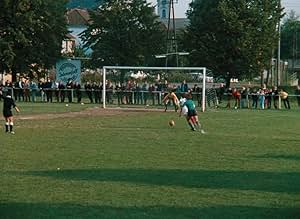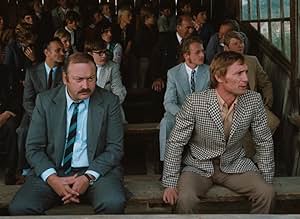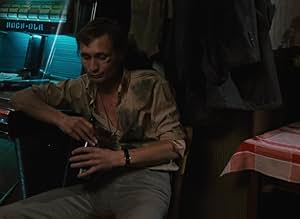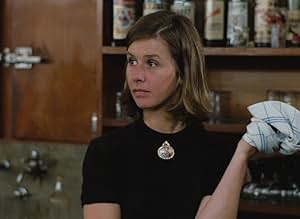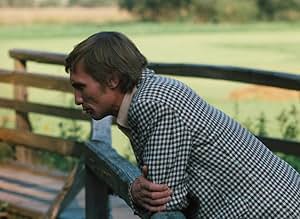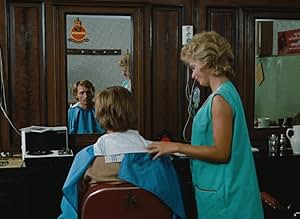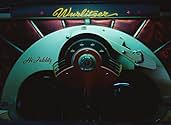Die Angst des Tormanns beim Elfmeter
- 1972
- 1 घं 41 मि
IMDb रेटिंग
6.5/10
2.5 हज़ार
आपकी रेटिंग
अपनी भाषा में प्लॉट जोड़ेंGoalkeeper Josef Bloch is ejected during a game for foul play. He leaves the field and goes to spend the night with a cinema cashier.Goalkeeper Josef Bloch is ejected during a game for foul play. He leaves the field and goes to spend the night with a cinema cashier.Goalkeeper Josef Bloch is ejected during a game for foul play. He leaves the field and goes to spend the night with a cinema cashier.
- पुरस्कार
- कुल 1 जीत
Monika Poeschl
- 1. Frisöse
- (as Monika Pöschl)
फ़ीचर्ड समीक्षाएं
The Goalkeeper's Fear of the Penalty is a great title but an odd underwhelming film from Wim Wenders, his cinematic debut.
I only wish it was about a goalkeeper who went all wobbly when about to face a spot kick.
The film does display some of Wender's cinematic tastes. A liking of Americana, being on the road, a character being a person of few words maybe alienated and a languid pace. There is an existentialism about this film.
Joseph Bloch (Arthur Brauss) is a goalkeeper who gets angry when a goal is not called offside. It is a strangely shot sequence as Bloch does not concentrate on the play and makes no attempt to even save the shot. In fact we do not even see the build up to the play.
Bloch gets sent off and as his team was playing away, he makes his way to the city centre where he watches a film. Later he spends a night with the cinema cashier and he than strangles her. Bloch then leaves the city and spends times with an ex girlfriend in the countryside. Bloch constantly reads the newspaper to see what is happening about the murder, there is also a mute boy who has disappeared. Bloch spends time with his ex, listening to American rock n roll and getting involved in bar fights.
If Bloch is upset about the murder we do not get to know about it. The movie is bookended by a football match, at one point Bloch tells a spectator about the various thoughts that go through in a goalkeeper's mind when a penalty is about to be taken.
The lead character is an enigma, he goes about his normal life but he is a killer, maybe he has killed before, maybe he is a fantasist with his interest in American music and carrying US currency. It could just be that Bloch is contemplative about his existence.
In terms of tension, there is not much at all. Bloch gets on with his life, he is never in danger, no one is closing in on him. Critically lauded, age has not been kind to this film. Slow moving and boring.
I only wish it was about a goalkeeper who went all wobbly when about to face a spot kick.
The film does display some of Wender's cinematic tastes. A liking of Americana, being on the road, a character being a person of few words maybe alienated and a languid pace. There is an existentialism about this film.
Joseph Bloch (Arthur Brauss) is a goalkeeper who gets angry when a goal is not called offside. It is a strangely shot sequence as Bloch does not concentrate on the play and makes no attempt to even save the shot. In fact we do not even see the build up to the play.
Bloch gets sent off and as his team was playing away, he makes his way to the city centre where he watches a film. Later he spends a night with the cinema cashier and he than strangles her. Bloch then leaves the city and spends times with an ex girlfriend in the countryside. Bloch constantly reads the newspaper to see what is happening about the murder, there is also a mute boy who has disappeared. Bloch spends time with his ex, listening to American rock n roll and getting involved in bar fights.
If Bloch is upset about the murder we do not get to know about it. The movie is bookended by a football match, at one point Bloch tells a spectator about the various thoughts that go through in a goalkeeper's mind when a penalty is about to be taken.
The lead character is an enigma, he goes about his normal life but he is a killer, maybe he has killed before, maybe he is a fantasist with his interest in American music and carrying US currency. It could just be that Bloch is contemplative about his existence.
In terms of tension, there is not much at all. Bloch gets on with his life, he is never in danger, no one is closing in on him. Critically lauded, age has not been kind to this film. Slow moving and boring.
It is difficult to comment on such a brilliant movie without having read the book first, or even better, being familiar with Peter Handke's narrative works. While it may seem evident (to us, accustomed to Hollywood's conventional plots) that the main character of The Goalie... is a madman, it is not evident at all. Handke's approach to narrative is to reflect exterior signs, rather than enter the character's inner thoughts. See The Lefthanded Woman for example: while it may seem, on the surface, that the woman does not have a reason for divorce, in fact she might have a lot, only she does not reveal what is on her mind. Same applies to the goalie: he would not speak his mind, therefore we, and even Handke himself (or Wenders) can not enter his own intimate realm. Whatever his reasons are for what he does (and murder is only one of his unexplained acts) we can not know them. The film is about communication between people more than murder. It is funny that most of us would assume he is mad just because we can not find an account of his acts: if you think about it, in the real world outside the movie realm, most people -and even our closest friends- would not tell us why they do what they do. And it does not necessarily mean they are mad.
Due the greatness that Wim Wenders became thru the years, his fundation made many efforts to try recover the worn out negative of this movie, as newbie director he had erroneously used several tracks of famous singers as Elvis Presley, Credence Clearwater, Roy Orbison and The Doors as well permissionless, whereby he can't afford due the high cost of the copyrights, on ultimate restoration a high advanced tools were used to regain the bright color.
However to solve the matter of expensive soundtrack already built-in previously on movie, then to fix it he inserts under a fresh one upon the original, just at bar sequence he got the consent from own singer Morisson freely previous his death, otherwise the movie could be buried for good all those info above is upon the own Wim Wenders statement contained on bonus material.
In fact he based on the Peter Handke's novel his closest friend in this directorial debut, over an average goalkeeper dismissed from the game by foul play, hereinafter wandering around committing foolish things to extent of throttle a woman, meanwhile such weirdo guy used to stay overnight in countless cheaper hotels at Austria and neighborhood areas, a kind of pointless existentialism offering, although we can oversee a promising filmmaker in this interesting minor flick.
Thanks for reading.
Resume:
First watch: 2024 / How many: 1 / Source: DVD / Rating: 7.
However to solve the matter of expensive soundtrack already built-in previously on movie, then to fix it he inserts under a fresh one upon the original, just at bar sequence he got the consent from own singer Morisson freely previous his death, otherwise the movie could be buried for good all those info above is upon the own Wim Wenders statement contained on bonus material.
In fact he based on the Peter Handke's novel his closest friend in this directorial debut, over an average goalkeeper dismissed from the game by foul play, hereinafter wandering around committing foolish things to extent of throttle a woman, meanwhile such weirdo guy used to stay overnight in countless cheaper hotels at Austria and neighborhood areas, a kind of pointless existentialism offering, although we can oversee a promising filmmaker in this interesting minor flick.
Thanks for reading.
Resume:
First watch: 2024 / How many: 1 / Source: DVD / Rating: 7.
This is a detective film, but it's not really a film noir or cop drama like we're used to in the U.S. However, there are lots of references to America's overwhelming cultural presence throughout.
For me, Jurgen Knieper's score serves the story well; the tune still comes back to me all these years later.
It's a simple monotonous tune, the main parts being just two notes that the small chamber group works back and forth. It may not sound like much, but in reality it becomes mesmerizing, almost like a 2nd main character, and something that won't release you, like fate.
The film, of course, is genius.
The understated music matches the film's lack of much excitement or development.
The visuals and music work to produce a profoundly unsettling look at the monotonous life of the murderer.
For me, Jurgen Knieper's score serves the story well; the tune still comes back to me all these years later.
It's a simple monotonous tune, the main parts being just two notes that the small chamber group works back and forth. It may not sound like much, but in reality it becomes mesmerizing, almost like a 2nd main character, and something that won't release you, like fate.
The film, of course, is genius.
The understated music matches the film's lack of much excitement or development.
The visuals and music work to produce a profoundly unsettling look at the monotonous life of the murderer.
Wim Wenders was always the most cerebral, the most cinematic of the three Giants of New German cinema (albeit Giants enough to bear favourable comparison even to cinematic Giants-For All-Ages such as Fritz Lang, and FW Murnau). In his hands, even a work so clearly of its maker as Ripley's Game became a perhaps even greater work, even more clearly of its maker such as The American Friend was, or as the Sam Shephard-scripted Paris, Texas was. And perhaps, too, this adaptation of a German bestseller likely is.
This film, despite the directors acknowledgements of the influence of Alfred Hitchcock - evident throughout - is A Masterpiece of control and content - admirable in a mature work by an established director, astonishing as a feature debut.
The title is relevant only in a later, casual, conversation the eponymous character has with a provincial policeman, where the policeman innocently spills out his m.o. when confronted by a criminal, but such is the nature of this study that we can't immediately be sure the psychopath is taking everything in. The murder itself isn't even shown in its grisly intensity, merely its foreplay and aftermath. And there's nothing to forewarn us of the killer's intentions: no taunting, no leering looks, no stalkings. (I saw parallels in the murder scene with a similar scene in Hitchcock's underrated 'Frenzy', but only in the way it was shot, and the aforementioned foreplay).
His scanning of every subsequent news report might suggest he's worried, that the noose is tightening around him. But his immediately subsequent actions suggest otherwise. Like the prototype psychopath, compassion is conspicuous by its absence from his every thought and action. But yet, in best cinematic tradition, what 'he' doesn't know is that we can see his every action, can scrutinise his every thought. Can condemn him for his indifference.
Only by giving every frame of this masterly film your full attention will you get to truly 'enjoy' its final frame.
The title is relevant only in a later, casual, conversation the eponymous character has with a provincial policeman, where the policeman innocently spills out his m.o. when confronted by a criminal, but such is the nature of this study that we can't immediately be sure the psychopath is taking everything in. The murder itself isn't even shown in its grisly intensity, merely its foreplay and aftermath. And there's nothing to forewarn us of the killer's intentions: no taunting, no leering looks, no stalkings. (I saw parallels in the murder scene with a similar scene in Hitchcock's underrated 'Frenzy', but only in the way it was shot, and the aforementioned foreplay).
His scanning of every subsequent news report might suggest he's worried, that the noose is tightening around him. But his immediately subsequent actions suggest otherwise. Like the prototype psychopath, compassion is conspicuous by its absence from his every thought and action. But yet, in best cinematic tradition, what 'he' doesn't know is that we can see his every action, can scrutinise his every thought. Can condemn him for his indifference.
Only by giving every frame of this masterly film your full attention will you get to truly 'enjoy' its final frame.
क्या आपको पता है
- ट्रिवियाThe film remained unavailable for three decades for reasons of music rights. (The original soundtrack includes works of Elvis Presley and the Rolling Stones, which is more expensive than the production of the film itself. ) To make the film possible to view again, the director Wim Wenders obtains the right of several songs and replaces other pieces with new songs of lyrics. Those were produced using period instruments and analog techniques from the 1950s to imitate the sound of that time as faithful as possible.
- गूफ़The newspaper article "Heiße Spur im Mordfall Gloria T." (Firm lead in Gloria T. murder case) is actually a newspaper article about a car crash and has nothing whatsoever to do with the movie's plot. It seems that only the headline was changed for the purpose of filming.
- कनेक्शनFeatured in Motion and Emotion: The Films of Wim Wenders (1990)
टॉप पसंद
रेटिंग देने के लिए साइन-इन करें और वैयक्तिकृत सुझावों के लिए वॉचलिस्ट करें
- How long is The Goalie's Anxiety at the Penalty Kick?Alexa द्वारा संचालित
विवरण
- रिलीज़ की तारीख़
- कंट्री ऑफ़ ओरिजिन
- भाषाएं
- इस रूप में भी जाना जाता है
- The Goalie's Anxiety at the Penalty Kick
- फ़िल्माने की जगहें
- उत्पादन कंपनियां
- IMDbPro पर और कंपनी क्रेडिट देखें
बॉक्स ऑफ़िस
- बजट
- DEM 6,20,000(अनुमानित)
इस पेज में योगदान दें
किसी बदलाव का सुझाव दें या अनुपलब्ध कॉन्टेंट जोड़ें

टॉप गैप
By what name was Die Angst des Tormanns beim Elfmeter (1972) officially released in India in English?
जवाब
